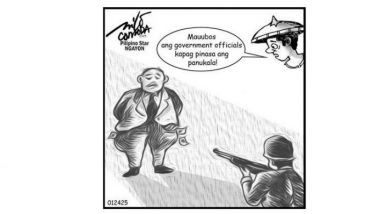US Senate votes to hike military, economic aid to RP – DILG
The United States Senate has voted to increase
There were reports earlier that the US Senate was downgrading its financial assistance to the country due to reported unhampered killings and enforced disappearances.
Interior Secretary Ronaldo Puno said the increase is a virtual vote of confidence by US legislators to the Arroyo government in addressing the issue of unexplained killings in the country.
Puno said the US Senate-approved allocations for the
Puno, the acting presidential political affairs adviser, said the Senate-approved funding support —comprising $30 million each in the Foreign Military Fund (FMF) and Economic Support Funds (ESF) outlays for the Philippines —marks a “major setback” for local left-wing organizations and their overseas allies that have mounted an anti-government lobby in the US Congress and elsewhere to prod American legislators into cutting US aid to the Arroyo administration.
He said the Washington-based Philippine Embassy officials, led by Ambassador Willy Gaa, should be credited for the “aggressive and pro-active drive on Capitol Hill” that resulted in this show of support by American lawmakers.
Gaa has been meeting and holding dialogues with US legislators, giving them the true picture with regard to the human rights situation in the country, and had apprised them of President Arroyo’s initiatives to put an end to the unexplained killings.
Citing a report from the Philippine Embassy in
The ESF was raised to $30 million as against the original request of $26 million.
Puno also said that in an apparent recognition of the initial efforts by the Arroyo government to address the issue of unexplained killings, the US Senate also voted to set aside another $2 million outlay for the
“In mounting such an aggressive and pro-active drive, Ambassador Gaa and the rest of our embassy officials have apparently made significant headway in putting across to American senators and representatives that contrary to the vicious disinformation campaign being waged by leftist organizations, the real human-rights situation in the Philippines is totally different from the one being hyped by these critics here and abroad, and that President Arroyo has actually been mounting decisive steps to address these killings,” Puno said.
Puno noted that the ghastly scenario of supposedly state-sanctioned killings of political dissidents, which Philippine-based leftist groups and their foreign allies have tried to present before the US Congress, had been debunked by the findings of the Melo Commission that there was “no direct evidence” linking the Armed Forces of the Philippines (AFP) or Malacañang to the killings of political activists.
“There is no official or sanctioned policy on the part of the military or its civilian superiors to resort to what other countries euphemistically call ‘alternative procedures,’—meaning illegal liquidations,” said the Melo Commission in its report.
Puno pointed out that no less than Philip Alston, the United Nations special rapporteur for human rights who visited the country earlier this year to look into the unexplained killings, had recognized the independence of the Melo Commission and even cited Mrs. Arroyo for her government’s “unqualified cooperation” and for “showing good faith” in creating a five-member probe body.
“Far from being a full indictment of the government and the military, as what the leftist groups have tried to portray, the subsequent Alston report had actually recognized the Arroyo administration’s “willingness to permit outside scrutiny, and a very welcome preparedness to engage on this issue,” Puno added.
But it will be remembered that Alston, in his departure, said that the military is in a state of denial over the unexplained killings of militant and peasant leaders as well as the enforced disappearances of rights activists. – Pia Lee-Brago
- Latest
- Trending





























